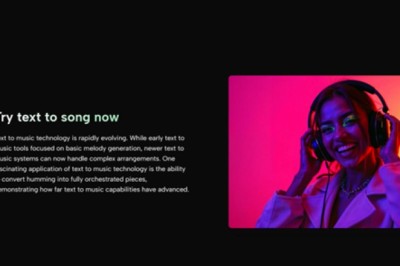views

Photo by Solen Feyissa on Unsplash
For every savvy business trying to get tons of traffic, SEO is a must-have strategy. And there’s no SEO without keyword research. While it might seem like a no brainer, some of us still struggle with choosing the right keyword to get the most out of our SEO strategy.
Keyword research can be tricky. Opting for overly obvious and easy keywords can steer us into a crowded field where our voice gets lost in the noise. But, when we veer towards long-tail and more unique keywords, we may overlook the potential for broader reach and visibility.
At the end of the day, it's a balancing act of sorts, where finding that sweet spot between relevance and specificity is key. Now we’ll dive more in-depth into keyword research and how to painlessly nail it.
What Is Keyword Research?
But first, let’s brush up on the basics. What actually is keyword research? Is it merely about plugging in words and phrases that we think people might search for, or is there more to it? Or maybe it's about uncovering the language that resonates most with our target audience?
The point of keyword research is to unravel the digital clues that lead us to the heart of what people are searching for online. It's not just about finding popular terms but rather understanding the intent behind those searches and aligning our content to meet those needs.
So, we can say that keyword research is all about understanding the language of the internet to connect our content with the right audience at the right time.
For example, if you’re a pet grooming salon, you’d want to use keywords like "dog grooming tips," "best cat grooming techniques," or "professional pet groomers near me" to make sure your business is found by those needing and seeking your services.
How to Do an Effective Keyword Research
Now that we know what keyword research is all about. Let’s move into some best practices that can help you find the right keyword without having to crack your brain.
Starts with a List of Topics
A great keyword research often starts with a comprehensive list of topics relevant to your business, industry, or niche. Thik of this list as the foundation upon which you'll build your keyword strategy.
If you’re a pet grooming salon, your broad categories might include "dog grooming," "cat grooming," "pet hygiene," "grooming supplies," and "professional grooming services."
Then, dive deeper into each one to uncover subtopics or related concepts. So, your more specific keywords would be "dog grooming styles," "cat grooming techniques," "pet bathing tips," "best grooming brushes," and "mobile pet grooming services." This step helps you identify specific areas of focus within broader themes that provide a more granular view of your content landscape.
Target a Specific Funnel Stage
Each funnel stage has a different search intent. To maximize the effectiveness of your keyword research, it's essential to target a specific stage of the buyer's journey or conversion funnel.
At the top of the funnel, where users are in the awareness stage, focus on keywords that address broad topics or pain points related to your industry. These may include informational queries such as "how to groom a dog at home" or "benefits of professional pet grooming."
Moving down the funnel to the consideration stage, users are actively seeking solutions to their problems and evaluating various options.
Here, target keywords that reflect product or service comparisons, customer reviews, and specific features or benefits. Examples include "best pet grooming salons near me," "dog grooming prices comparison," or "pet grooming package deals."
Now at the bottom of the funnel, users are ready to make a purchase or take action. Keywords in this stage should be transactional and focus on driving conversions. Think of terms like "book pet grooming appointment," "buy pet grooming supplies online," or "discounted pet grooming services."
Use Keyword Research Tools
Keyword research tools save the day. Even if you don’t yet have any technical SEO knowledge, these tools at least make keyword research hassle-free.
With just a few clicks, you can find tons of valuable insights into search volume, competition level, and potential keyword variations.
From popular options like Google Keyword Planner and SEMrush to more specialized tools like Ahrefs and Moz Keyword Explorer, there's always an option available to suit every need and budget.
And when you have zero budget, there are also useful and powerful keyword research tools you can still use, like Google and YouTube Auto Suggestions.
Pay Attention to Keyword Length and Difficulty
We’ve talked about this briefly in the beginning. Let’s get more in-depth into it.
Short-tail keywords, typically consisting of one or two words, may seem appealing due to their broad reach and high search volume. The thing is, they often come with intense competition, so it’s challenging to rank prominently in search results.
On the other hand, long-tail keywords, comprising three or more words, offer a more targeted approach that caters to specific user intents and is more likely to bring higher conversion rates.
Another example, if you’re a voice-over agency, targeting the short-tail keyword "voice-over" might seem like the obvious choice, given its high search volume. However, competition for this keyword is fierce, making it difficult to stand out.
Instead, focusing on long-tail keywords such as "professional voice-over services for video ads" or "female voice-over artist for audiobooks" allows you to capture a more niche audience actively seeking your specialized services
While long-tail keywords may have lower search volume individually, they collectively account for a significant portion of overall searches and present an opportunity to capture highly qualified traffic with less competition.
When evaluating keyword difficulty, consider factors such as domain authority, backlink profile, and content relevance to assess your likelihood of ranking for a particular keyword.
While targeting highly competitive keywords can yield valuable traffic, it may take a lot of time and resources to outrank established competitors. Meanwhile, focusing on low-competition keywords allows for quicker wins and establishes your presence in niche markets.
Think Creatively
Conducting keyword research doesn’t have to be a mundane or rigid task confined to traditional methods. Instead of solely relying on generic keyword suggestions, consider alternative approaches to uncovering relevant keywords that resonate with your target audience.
One creative strategy is to brainstorm outside the box and tap into the language and terminology used by your audience in everyday conversations, social media interactions, or customer feedback.
Listening closely to how your audience describes their needs, challenges, and preferences helps you find unique keyword opportunities that may not appear in conventional keyword research tools.
Also, don't shy away from exploring related topics or adjacent industries for inspiration. Oftentimes, keywords with high relevance and low competition can be found by thinking laterally and identifying niche areas of interest that intersect with your core offerings.
Wrapping Up
Every business is unique. Therefore, each of them requires a tailored approach to keyword research that aligns with its individual goals, target audience, and competitive landscape.
But no matter what keyword you’re looking for, these actionable practices will make it a lot easier for you to understand how exactly your audiences use the internet to find what you offer.
One thing to bear in mind here is that keyword research isn’t just about picking out a few words or phrases and calling it a day. It’s an ongoing process that requires constant monitoring and adaptation. Keep track of your keyword performance metrics, analyze the data, and adjust your strategy accordingly.
Author Bio
Andre Oentoro is the founder of Breadnbeyond, an award-winning explainer video company. He helps businesses increase conversion rates, close more sales, and get positive ROI from explainer videos (in that order).





















Comments
0 comment